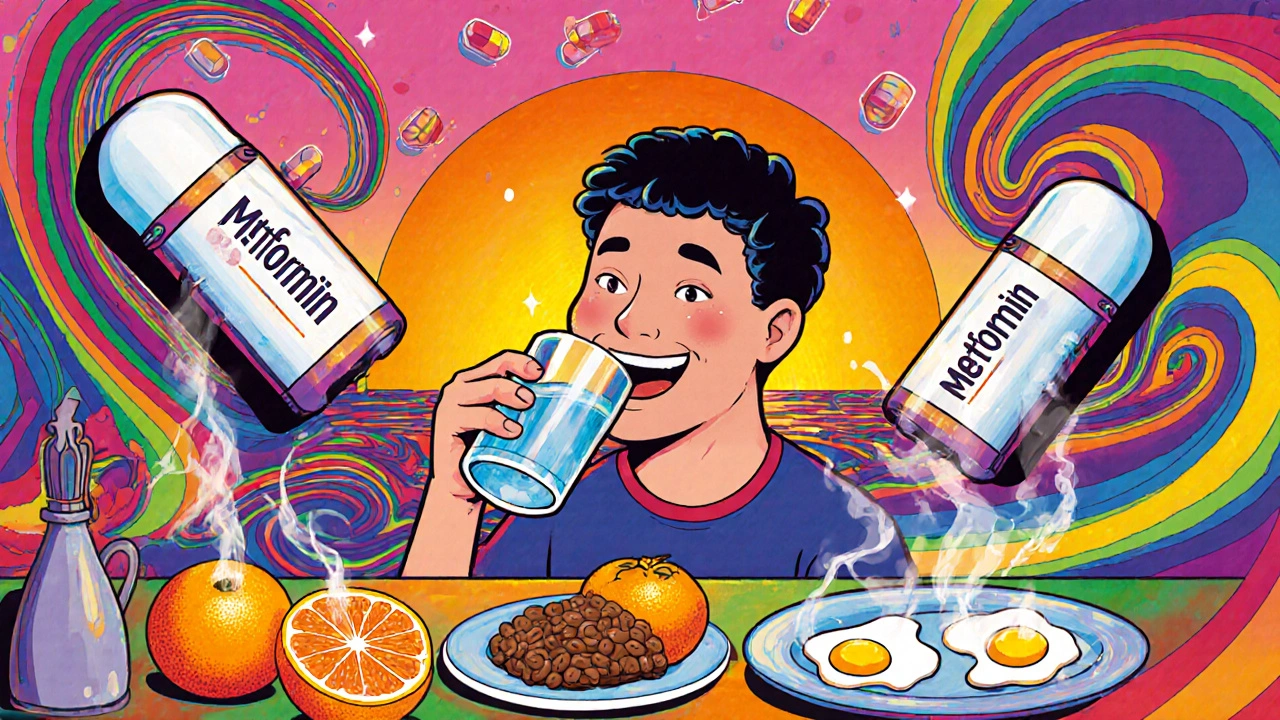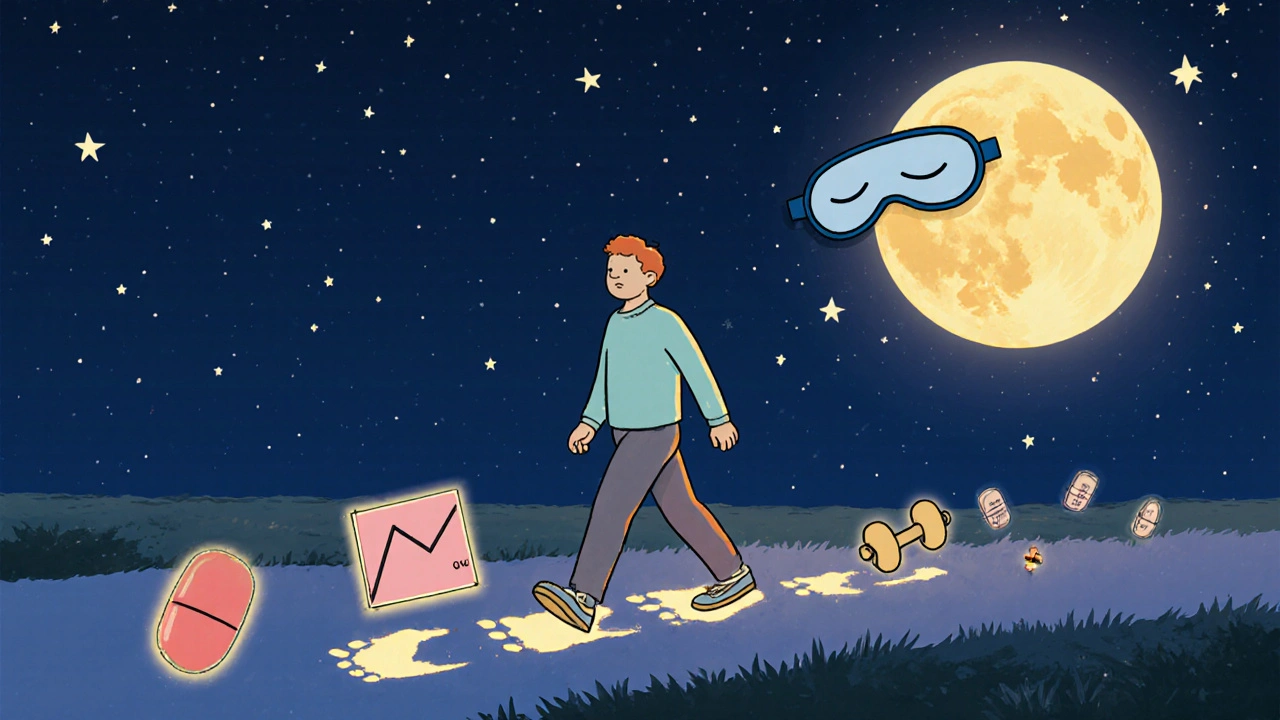Lifestyle Changes to Reduce Medication Side Effects: Practical Guide
 Oct, 28 2025
Oct, 28 2025
Side Effect Reduction Calculator
How It Works
Based on clinical studies, small lifestyle adjustments can reduce medication side effects by 30-70%. Enter your medication details below to see potential benefits.
Your Estimated Reduction
0%
When you're on medication, side effects can feel like a hidden cost you didn’t sign up for. Nausea from diabetes drugs. Fatigue from blood pressure pills. Muscle pain from statins. Weight gain from antidepressants. These aren’t just annoyances-they can make you skip doses, quit treatment, or end up back in the hospital. But here’s the truth most doctors don’t tell you: lifestyle changes can cut those side effects in half-or more-without touching your prescription.
How Your Daily Habits Change How Medicines Work
Your body doesn’t treat medicine like a magic bullet. It processes drugs through your liver, gut, and muscles. And what you eat, how you sleep, how much you move, and even how you handle stress all change how those drugs are absorbed, broken down, and cleared from your system. For example, grapefruit juice doesn’t just taste sour-it blocks enzymes in your liver that break down statins. That means more of the drug stays in your blood, raising your risk of muscle damage. On the flip side, eating a consistent amount of carbs at each meal helps your body handle metformin better, slashing nausea by nearly 40%. It’s not about being perfect. It’s about being smart with the small things.Move More to Cut Fatigue, Muscle Pain, and Weight Gain
If you’re on beta-blockers and feel like you’re dragging all day, the last thing you want to do is exercise. But skipping movement makes it worse. A 2022 study showed that starting with just 10 minutes of walking twice a day, then slowly building up to 30 minutes five days a week, improved energy levels by 41% in eight weeks. Same goes for statins. About 1 in 3 people on these cholesterol drugs get muscle aches. But adding two short resistance sessions a week-like lifting light dumbbells or doing bodyweight squats-cut that pain in half when combined with 200mg of coenzyme Q10 daily. That’s not a supplement miracle. It’s your body getting the fuel it needs to repair muscle tissue while the drug works. For antipsychotics or antidepressants that cause weight gain, the fix isn’t just dieting. It’s movement + protein. A 2023 NIMH study found that people who did 45 minutes of brisk walking or cycling daily, plus ate 30g of protein at every meal (think eggs, chicken, tofu, Greek yogurt), gained just 2.1kg in a year. Those who didn’t? Nearly 8kg. That’s not luck. It’s biology.Eat Smarter, Not Just Less
You don’t need a fancy diet. You need to know what your meds don’t like. If you take warfarin (a blood thinner), kale, spinach, and broccoli aren’t bad-but eating them inconsistently is. One day you eat a big salad, the next you skip it? Your INR levels swing. Keep your vitamin K intake steady-around 150mcg a day-and your blood thinning stays predictable. For GLP-1 drugs like semaglutide (Ozempic, Wegovy), nausea hits 70% of people during the first few weeks. But slow down. Eat smaller meals (under 500 calories). Avoid spicy or acidic foods. Don’t eat within three hours of bed. Drink 2.5 liters of water daily. Do all that, and nausea drops from 73% to 29%. And if you’re on metformin? Eat carbs evenly across meals-no giant pasta bowls at dinner. Stick to 30g per meal. That simple tweak cuts stomach upset by a third and helps your blood sugar stay steadier, too.Sleep Isn’t Just Rest-It’s Medicine
Most people don’t realize their liver works harder at night. That’s when most drugs are processed. If you’re sleeping only five hours, your liver enzymes don’t get the time they need. That means drugs like statins, antidepressants, and painkillers stick around longer-or don’t break down properly. Research from the National Sleep Foundation shows that getting 7-9 hours of quality sleep boosts drug metabolism by 22%. That’s the same as lowering your dose by 10-15% without changing your prescription. Try this: Go to bed and wake up at the same time every day-even weekends. Keep your room cool (18-20°C). No screens 45 minutes before bed. If you’re on antidepressants, poor sleep makes side effects like drowsiness and weight gain worse. Fix your sleep, and you might not need to switch meds.
Stress Is a Silent Drug Interferer
Chronic stress floods your body with cortisol. That hormone changes how your liver processes meds. It can make antidepressants less effective and raise your blood pressure even when you’re on pills to lower it. A 2021 JAMA Psychiatry study found that 30 minutes of mindfulness meditation daily-just sitting quietly, focusing on your breath-cut cortisol by 27%. That led to a 31% improvement in how well antidepressants worked and reduced side effects like weight gain and emotional numbness. You don’t need to meditate for an hour. Start with five minutes. Use a free app like Insight Timer. Or just sit with your eyes closed while you sip tea. The goal isn’t to clear your mind. It’s to give your nervous system a break.What to Ask Your Doctor (And When)
Lifestyle changes aren’t a substitute for meds. They’re a partner. But too many doctors never bring it up. Here’s what to say at your next appointment:- “I’m having side effects from [medication]. Are there lifestyle changes that might help?”
- “Is there a food or drink I should avoid with this drug?”
- “Could my sleep or stress levels be making this worse?”
- “Would it be safe to try a small increase in activity while I’m on this?”
Realistic Steps to Start Today
You don’t need to overhaul your life. Pick one thing. Do it for two weeks. Then add another.- Hydrate first. Drink a glass of water when you wake up. Aim for 2-3 liters daily. Many side effects (headaches, dizziness, constipation) are just dehydration.
- Time your meals. Eat carbs evenly. Don’t skip breakfast. Avoid late-night snacks if you’re on diabetes or GI meds.
- Walk 10 minutes after dinner. It helps digestion, lowers blood sugar, and improves sleep.
- Check your grapefruit. If you’re on statins, blood pressure, or some antidepressants, swap it for oranges or apples.
- Sleep schedule. Set a bedtime alarm. Stick to it for 7 days.

What Not to Do
Don’t stop your meds because you feel better. Don’t double up on supplements without asking your doctor. Don’t assume natural means safe. St. John’s Wort can make birth control fail. High-dose vitamin E can interfere with blood thinners. And cutting salt too fast while on blood pressure meds can cause dangerous drops in pressure. Every change should be slow, tracked, and approved by your prescriber. The goal isn’t to go off your meds-it’s to make them work better with fewer side effects.Why This Works Better Than You Think
The science is clear: lifestyle changes don’t just mask side effects. They fix the underlying problems that made you need meds in the first place. High blood pressure? Exercise and low sodium can cut your dose-or eliminate it. Type 2 diabetes? Meal timing and movement can improve HbA1c as much as extra pills. High cholesterol? A Mediterranean diet with daily movement often lowers LDL more than a low-dose statin. This isn’t alternative medicine. It’s what top hospitals like Mayo Clinic and Cleveland Clinic are doing now. Their Lifestyle 180 program cuts medication use by 72% for metabolic conditions-not by replacing pills, but by making them work better.What’s Next
The future is personal. Stanford and the NIH are testing AI tools that predict how your gut bacteria, sleep patterns, and diet interact with your meds. In 2025, you might get a custom lifestyle plan built just for your prescription. But you don’t need to wait. Right now, you have everything you need: your body, your habits, and your doctor. Start small. Track how you feel. Talk to your care team. You’re not just taking medicine-you’re healing your whole system.Can lifestyle changes really reduce my medication side effects?
Yes. Studies show that simple changes like walking 150 minutes a week, eating consistent meals, getting 7-9 hours of sleep, and managing stress can reduce side effects like nausea, fatigue, muscle pain, and weight gain by 30-70%. These changes help your body process drugs more efficiently and reduce the need for higher doses.
Should I stop taking my medication if I start making lifestyle changes?
Never stop or change your medication without talking to your doctor. Lifestyle changes support your meds-they don’t replace them. Stopping suddenly can cause dangerous rebound effects like high blood pressure spikes, blood sugar crashes, or worsening depression. Always work with your prescriber to adjust doses safely.
What foods should I avoid with common medications?
Grapefruit juice interferes with statins, some blood pressure drugs, and certain antidepressants by blocking liver enzymes that break them down. Vitamin K-rich foods like kale and spinach can reduce the effect of warfarin if your intake isn’t consistent. Alcohol can worsen drowsiness from sedatives and increase liver strain from painkillers. Always ask your pharmacist about food-drug interactions for your specific meds.
How long does it take to see results from lifestyle changes?
Most people notice improvements in energy, digestion, or sleep within 2-4 weeks. For metabolic changes like lower blood pressure or improved blood sugar, it usually takes 6-12 weeks. The key is consistency-not perfection. Small daily habits add up faster than big, short-lived efforts.
Can I use supplements to reduce side effects?
Some, yes-but only under medical guidance. Coenzyme Q10 (200mg daily) helps with statin-related muscle pain. Magnesium can ease constipation from opioids. But many supplements interact dangerously with meds. St. John’s Wort can make birth control fail. High-dose vitamin E can thin your blood. Always tell your doctor what supplements you’re taking.
Why don’t doctors talk more about lifestyle changes?
Time and training. Only 28% of U.S. medical schools require lifestyle medicine training. Most appointments are 10-15 minutes, focused on prescriptions. But that’s changing. Hospitals like Mayo and Cleveland Clinic now have health coaches who work with patients on lifestyle plans. Ask your doctor if your clinic offers this support.
Vasudha Menia
October 28, 2025 AT 14:34OMG I just started walking 10 mins after dinner and my metformin nausea is GONE 😭 I’ve been taking it for 8 months and this is the first time I haven’t felt like I’m gonna puke after eating. Thank you for this post!! 🙏❤️
Alex Rose
October 28, 2025 AT 23:57While the anecdotal evidence presented is compelling, the methodological rigor of the cited studies is questionable. The 2022 study on beta-blockers and walking lacks a control group, and the 41% energy improvement metric appears to be self-reported without blinding. Furthermore, the 2023 NIMH study conflates correlation with causation-protein intake and caloric restriction are confounding variables not adequately isolated. Until these confounders are addressed via RCTs, these claims remain speculative at best.
Alanah Marie Cam
October 30, 2025 AT 09:35Thank you for sharing this. As a nurse practitioner, I’ve seen patients drastically reduce their statin dose after adopting consistent movement and CoQ10 supplementation under supervision. The liver’s metabolic efficiency improves with circadian alignment-sleep timing matters more than most realize. I always encourage my patients to track their sleep and meals in a simple journal. Small changes, sustained, create measurable shifts in pharmacokinetics.
prajesh kumar
October 31, 2025 AT 03:57Bro this is life changing I was on semaglutide and thought I’d never eat again without throwing up but now I just eat small meals and drink water like a robot and boom no more nausea. I used to think I was broken but turns out my body just needed structure not magic pills. Keep it real guys
Snehal Ranjan
November 1, 2025 AT 22:40It is indeed a profound observation that the human physiological system operates not as a collection of isolated organs but as an integrated network wherein dietary intake, circadian rhythm, physical activity, and psychological stress collectively modulate hepatic enzyme activity and renal clearance mechanisms. The pharmacokinetic variability observed in patients on chronic medication is thus not merely a function of dosage but of lifestyle architecture. One must recognize that modern medicine has historically prioritized pharmacological intervention over holistic modulation, yet the convergence of epigenetic research and metabolic physiology now validates what ancient traditions have long intuited-that harmony with nature is the truest form of therapeutics.
Kshitiz Dhakal
November 3, 2025 AT 21:44Of course lifestyle matters. But let’s be real-this is just biohacking for the middle class. What about the guy working two jobs, sleeping 4 hours, eating gas station food, and still on 5 meds? You’re preaching to the choir who can afford to walk after dinner. Meanwhile, the system keeps prescribing, never asking. 🤷♂️
Sabrina Aida
November 4, 2025 AT 17:44So let me get this straight-you’re telling me that if I just stop eating grapefruit and do yoga, my doctor will magically stop charging me $200 for a statin? This is the same logic that says if you ‘think positive’ your cancer will go away. The pharmaceutical-industrial complex doesn’t want you to know this because it would collapse their entire revenue model. Wake up. We are being manipulated by both Big Pharma AND Big Wellness.
Arpit Sinojia
November 5, 2025 AT 20:51From India here-our grandmas knew this stuff before any doctor did. No grapefruit, eat at same time, sleep early. We didn’t need studies to tell us. Now we’re copying Western medicine and forgetting our own wisdom. The real problem? Doctors don’t listen. They just write scripts. I saw my uncle on blood pressure meds for 10 years, then he started walking daily and eating dal-rice on time-now he’s off all meds. No magic. Just rhythm.
Mim Scala
November 7, 2025 AT 07:16I’ve been on antidepressants for 5 years. The fatigue and weight gain were crushing. I started with 5 minutes of breathing before bed-no app, just me and my tea. Then I added 10-minute walks. Slowly, the emotional numbness faded. I didn’t feel ‘fixed’-but I felt more like myself. I didn’t stop my meds. I just gave my body space to work with them. It’s not about doing more. It’s about stopping the noise.
Mer Amour
November 8, 2025 AT 23:43Anyone who believes lifestyle changes can ‘cut side effects in half’ is either dangerously naive or actively misleading. The pharmacodynamics of SSRIs, statins, and antihypertensives are governed by receptor binding, enzyme kinetics, and genetic polymorphisms-not whether you drank enough water. This post is a dangerous oversimplification that erodes trust in evidence-based medicine. If you’re experiencing side effects, consult your physician for dose adjustment or alternative agents-not some wellness influencer’s bedtime routine.